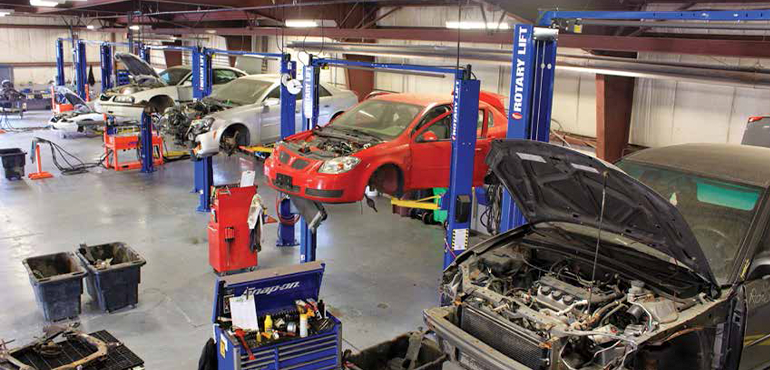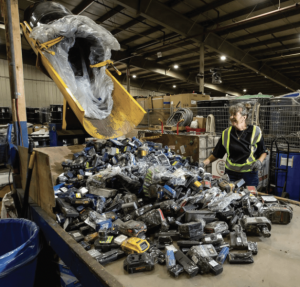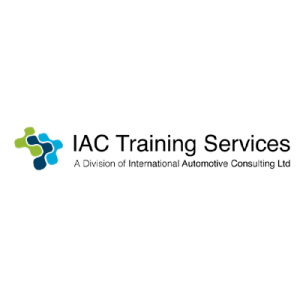By/Par Allison Rogers
Natalie Miller reflects on the industry during a time of change
This year, Canadian Auto Recyclers names Natalie Miller of Miller Auto Recycling in Fort Erie, Ontario as Woman of the Industry for 2020. Recently named as the Auto Recycler’s Association’s Canadian representative, Miller has previously served on ARA’s Educational Planning Committee for the past two years. As well, she is actively on the Board of Directors for the Ontario Auto Recyclers Association.
Canadian Auto Recycler’s recently caught up with Natalie to hear her take on her time as a business leader, the role of Canadians in the ARA, the challenges facing women in the auto recycling sector, and her thoughts on the future of the industry.
On her proudest moment as a business leader:
I have to say the way our team handled the initial COVID outbreak in March makes me proud as a business leader. There was a moment for myself, and our team when we realized that everything was changing and we needed to respond quickly. With every decision and action, there were new challenges that arose.
We made efficiency and procedural changes immediately, which unfortunately included laying off some staff initially. However, once the government grants and wage subsidies were announced then clearly outlined, we were able to maintain our level of staff from that point on. There is certainly no
better team building exercise than facing the challenges of this pandemic.
On the industry’s biggest challenges at the moment:
You will hear this often from recyclers right now, but for good reason— salvage procurement has become so incredibly challenging. When on conference calls or in conversation with recyclers all over the Canada, and the US, the same message resonates ‘It is hard to buy, if not near impossible.”
The pandemic immediately resulted in less vehicles on the road, which then resulted in a significant decline in the availability of salvage at the auctions. The real question is, “what is this going to look like in the longterm for all recyclers?” It is certainly an area of concern for all recyclers, and our industry as a whole.
On her new role with the ARA:
“I’ve just started my new role as the Canadian representative, replacing Dalbert Livingstone. But I have been involved in the ARA’s Education Planning Committee for a while. It’s been really interesting to see what the ARA is doing for the US and for auto recyclers throughout North America. Two years ago, Sandy Blalock asked me to co-chair the planning committee. I was flattered and said, ‘I’ll take it.’
The truth is, I don’t even know how my name came up. I remember getting a message from Steve Fletcher who congratulated me on being at the top of the shortlist—and had no idea I was even being considered.”
On the challenges facing woman of the industry:
“When I started in the industry, it felt very male dominated, at that point there were only two strong, successful female yard owners in Ontario. Mary Poirier from Valley Automotive being one, she remains incredibly supportive of myself in the industry to this day as well as other women entering the industry.
As I became more involved with peer groups, conventions and other industry related events throughout Canada and the US, it was evident over the years that more women are representing the auto recycling industry in a variety of roles. Most recently, my involvement with the ARA Board of Directors has provided the privilege of working with such accomplished women as Sandy Blalock and Shan McMillion.
Mentors have a big role to play for anyone entering this industry—especially women. At my very first OARA meeting in 2009, I was approached by Becky Berube of UCC. She was just wonderful to me, and we shared some terrific conversation. At that time, I was not even in the family business yet and my knowledge and experience remained very limited. She was happy to answer my questions and learn more about my background.
For the past two years, we served as co-chairs of the ARA Education Planning Committee.
Aside from women supporting women in the industry, hands down there have been many male colleagues who have been great mentors. The first one that comes to mind is Marty Hollingshead, he is a passionate, knowledge and progressive auto recycler from outside of Chicago. Marty has visited our operation and provided valuable input, then he was more than gracious in sharing his knowledge when I was able to visit his facility a few years ago. In my early years in auto recycling, I always felt there was an assumption that if you could not do all aspects of the operation then it was a fault in my abilities. I am so grateful to many of my colleague’s male and female for demystifying this for me.
Still to this day with over 10 years in the business, I often get asked “What do you do in the business or what do you do day to day?”. I used to take slight offensive to this question, and was never really sure how to properly answer this question, or explain what my daily role entailed.
With time, I have learned to take this as an opportunity to reverse the question and learn about the individual who initially posed the question, and their business.
It’s true—I don’t actually inventory the parts, but that doesn’t mean I am not capable of running things from a bigger picture perspective. Plenty of women are out there inventorying parts—but I’m more interested in reshaping the business.
I used to be more defensive. Now, men who sit down with me often say, ‘yeah, so you actually know what you’re talking about.’”
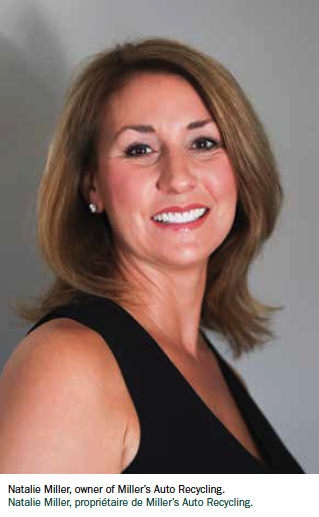
THIS YEAR, CANADIAN AUTO RECYCLERS NAMES NATALIE MILLER OF MILLER AUTO RECYCLING IN FORT ERIE, ONTARIO AS WOMAN OF THE INDUSTRY FOR 2020.
CETTE ANNÉE, CANADIAN AUTO RECYCLERS NOMME NATALIE MILLER DE MILLER AUTO RECYCLING À FORT ERIE, EN ONTARIO, FEMME DE L’INDUSTRIE POUR 2020.
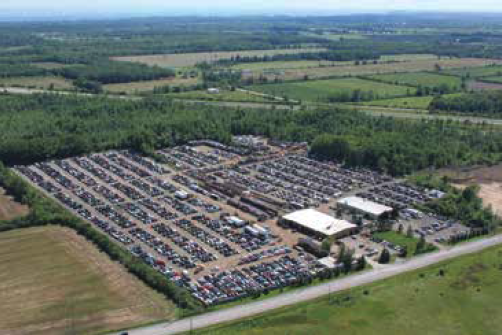
Natalie Miller réfléchit sur l’industrie à une époque de changement
Cette année, Canadian Auto Recyclers nomme Natalie Miller de Miller Auto Recycling à Fort Erie, en Ontario, femme de l’industrie pour 2020. Récemment nommée représentante canadienne de l’Auto Recycler’s Association, Miller a déjà été coprésidente du comité de planification de l’OARA . Canadian Auto Recycler a récemment rencontré Natalie pour l’entendre parler de son temps en tant que chef d’entreprise, du rôle des Canadiens dans l’ARA, des défis auxquels font face les femmes dans le secteur du recyclage automobile et de ses réflexions sur l’avenir de l’industrie.
Sur son moment le plus fier en tant que chef d’entreprise:
«Je pense à la façon dont nous avons géré l’épidémie initiale de COVID en mars. Après toutes ces années et leurs hauts et leurs bas, c’est le moment où nous nous sommes dit: «les choses ont changé, mais nous allons le faire.» Nous avons apporté rapidement des changements d’efficacité – nous avons dû réduire nos effectifs. Mais cela signifiait que lorsque les subventions sont arrivées, nous n’avons pas eu besoin de faire notre deuxième série de coupes. Certaines personnes mettent tout en pièces, d’autres le mettent ensemble. »
Sur les plus grands défis de l’industrie à l’heure actuelle
«Vous entendrez beaucoup cela, mais pour une bonne raison, l’approvisionnement en matière de récupération est devenu un défi incroyable. Je parle à des recycleurs du Texas, de Californie et du monde entier – c’est la même chose. «C’est difficile à acheter.»
Depuis la pandémie, il y a eu une diminution des accidents car les conducteurs travaillent à domicile. Cela a entraîné une diminution du volume des radiations totales.
La vraie question est: «À quoi cela va-t-il ressembler à long terme?» C’est quelque chose pour lequel nous ne savons pas quand cela changera. À chaque amélioration, nous voyons de nouveaux défis. »
Sur son nouveau rôle avec l’ARA:
“Je viens de commencer mon nouveau rôle en tant que ARA Canadian liaison. Mais je suis impliqué dans l’ARA depuis un certain temps. C’est vraiment intéressant de voir ce que fait l’ARA pour les États-Unis et pour les recycleurs d’automobiles partout en Amérique du Nord. Il y a deux ans, Sandy Blalock m’a demandé de coprésider le comité de planification. J’étais flatté et j’ai dit: «Je vais le prendre.»
La vérité est que je ne sais même pas comment mon nom est venu. Je me souviens avoir reçu un appel de Steve Fletcher qui m’a félicité d’être en tête de la liste des finalistes – et je ne savais même pas que j’étais même considéré.»
Sur les défis auxquels est confrontée la femme de l’industrie:
«Quand j’ai commencé dans l’industrie, c’était dominé par les hommes au Canada. Cependant, vous commencez à voir un vote de soutien pour les femmes dans l’industrie. Tout le monde a été si serviable et compréhensif. Les hommes soutiennent tellement les femmes dans l’industrie et s’entraident – et c’est une chose merveilleuse. Les mentors ont un grand rôle à jouer pour quiconque se lance dans cette industrie, en particulier les femmes. Lors de ma toute première réunion OARA en 2009, j’ai été approchée par Becky Berube de l’UCC. Elle était tout simplement merveilleuse pour moi et nous avons eu une longue conversation. À l’époque, je ne savais pas vraiment de quoi elle parlait. Elle était heureuse de l’expliquer.
Nous avons ensuite travaillé ensemble en tant que coprésidents du comité de planification de l’ARC. Au fil des ans, elle a été une merveilleuse mentor. En m’impliquant dans des groupes de pairs et des événements de l’industrie, j’ai réalisé qu’il y avait beaucoup plus de femmes impliquées dans l’industrie aux États-Unis.J’ai également fait la connaissance de Sandy Blalock et Shan McMillon, qui sont toutes deux des inspirations.
Il est encore dominé par les hommes, mais on accorde moins d’attention aux femmes qui dirigent des entreprises.
Marty Hollingshead est un gars «old school», mais il a été formidable. Je dois bien le connaître et il déroule le tapis rouge pour me montrer son entreprise et ses opérations. Il est sérieux, passionné et connaît bien l’industrie. Il est formidable et il est passionné par l’entreprise.
Scott Robertson est également formidable. Il est tout au sujet de soutenir l’industrie, et voit aider les femmes dans l’industrie comme faisant partie de cela. Au Canada, on suppose que si vous n’exercez pas certains rôles, vous ne pouvez pas vraiment comprendre comment fonctionne l’industrie. L’une des questions qui me sont souvent posées est: «Mais que faites-vous réellement dans l’entreprise?»
C’est vrai – je n’inventorise pas réellement les pièces, mais cela ne veut pas dire que je ne suis pas capable d’exécuter les choses dans une perspective plus large. Beaucoup de femmes inventorient des pièces, mais je suis plus intéressée par la refonte de l’entreprise.
J’étais plus sur la défensive. Maintenant, les hommes qui s’assoient avec moi disent souvent: «Oui, donc vous savez vraiment de quoi vous parlez.»




